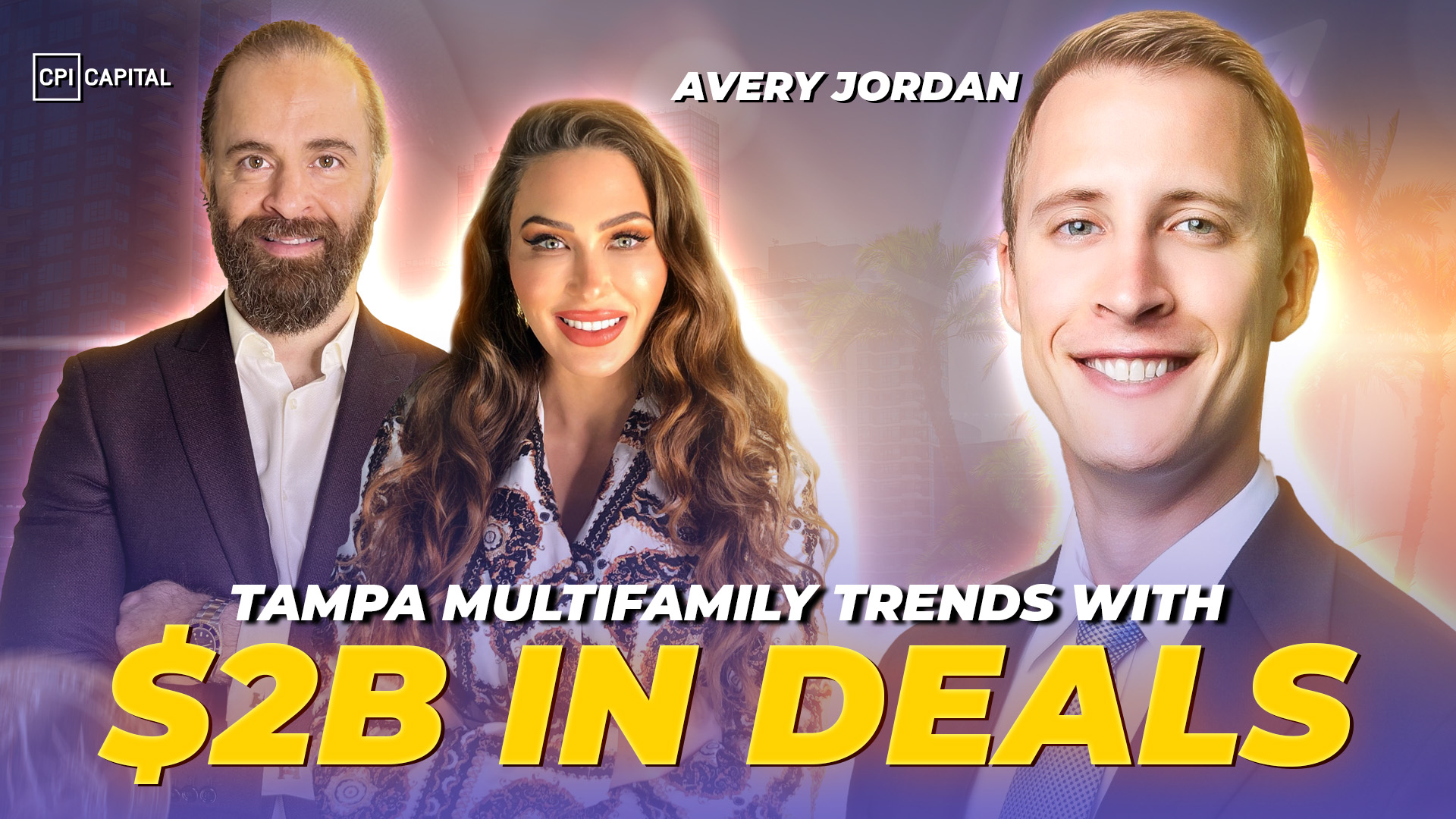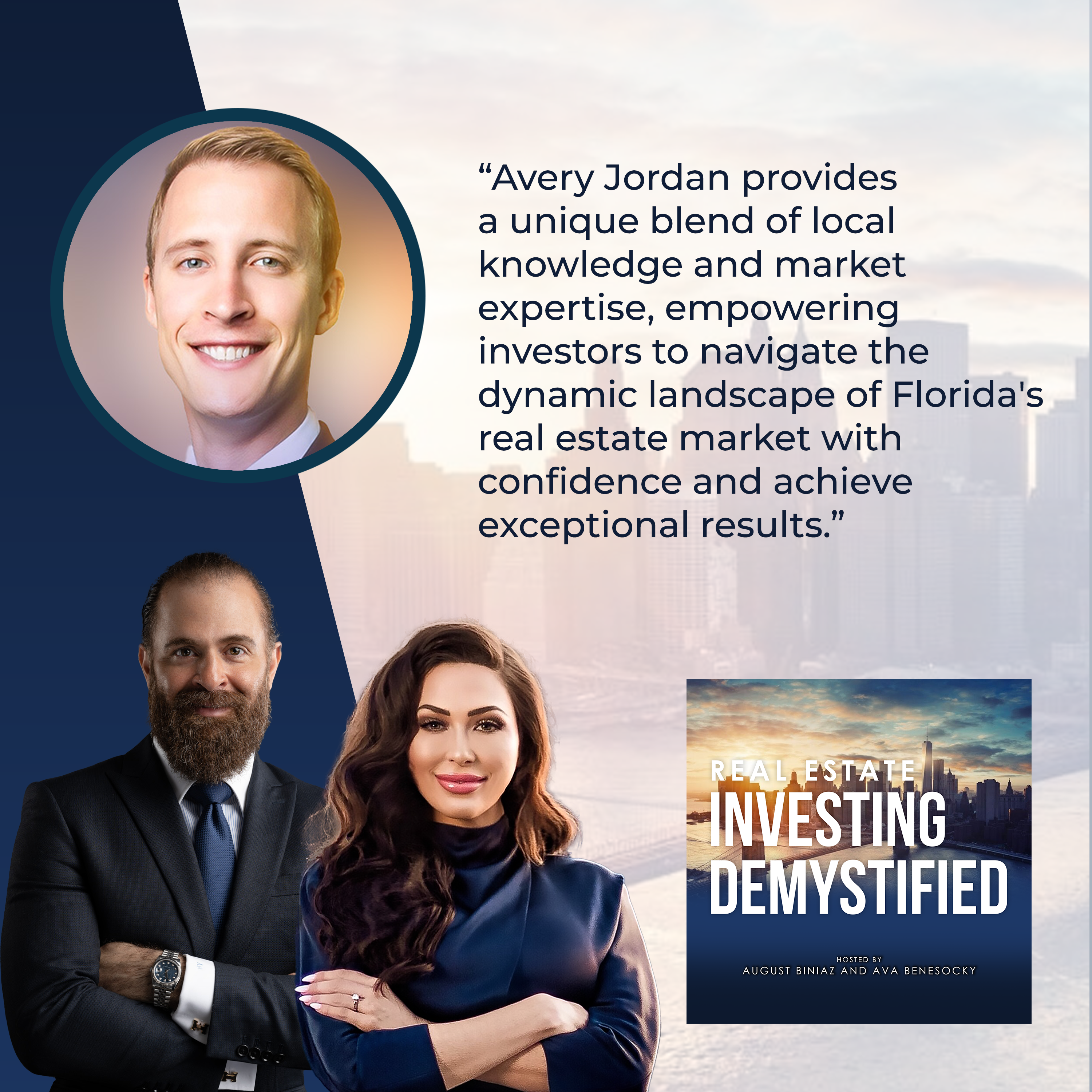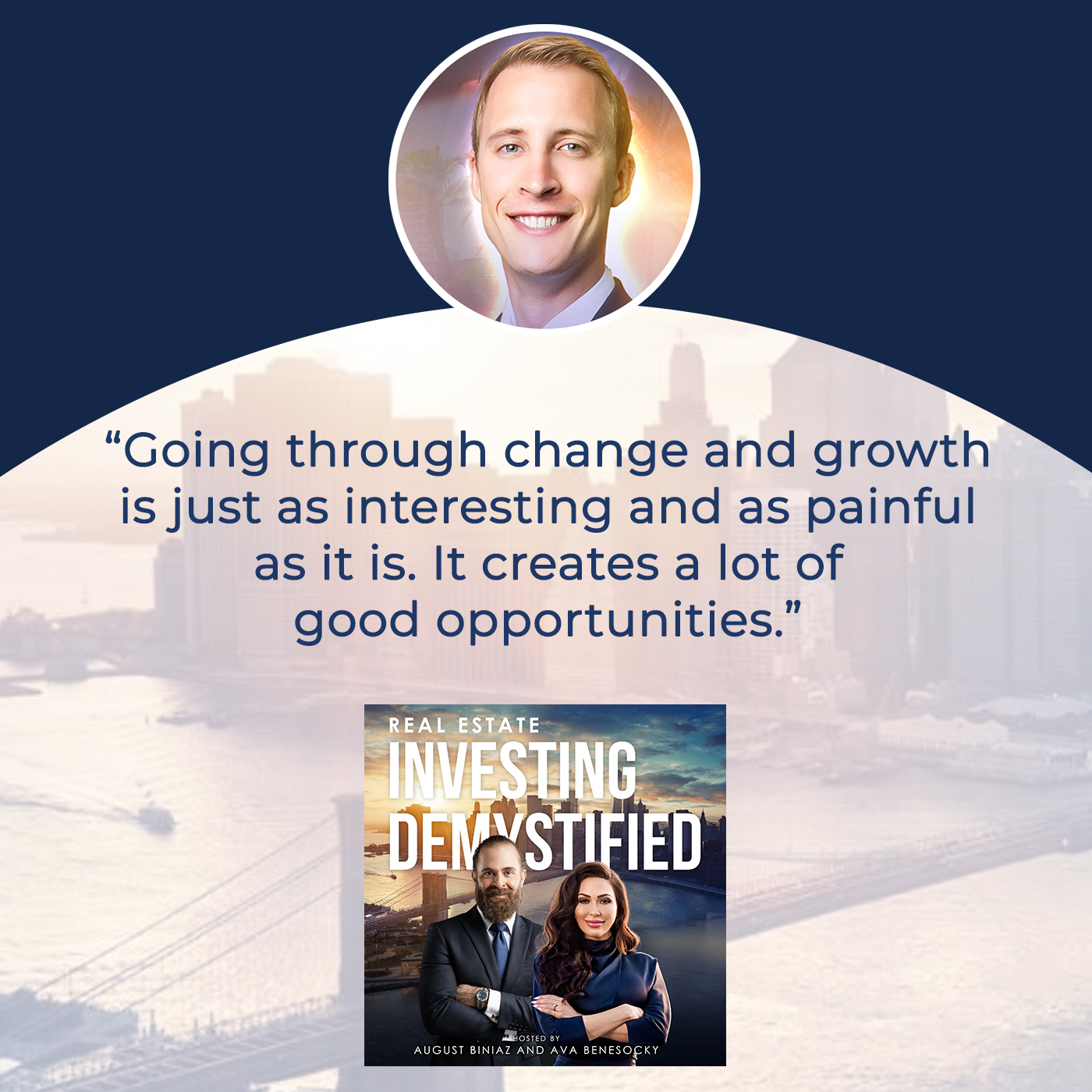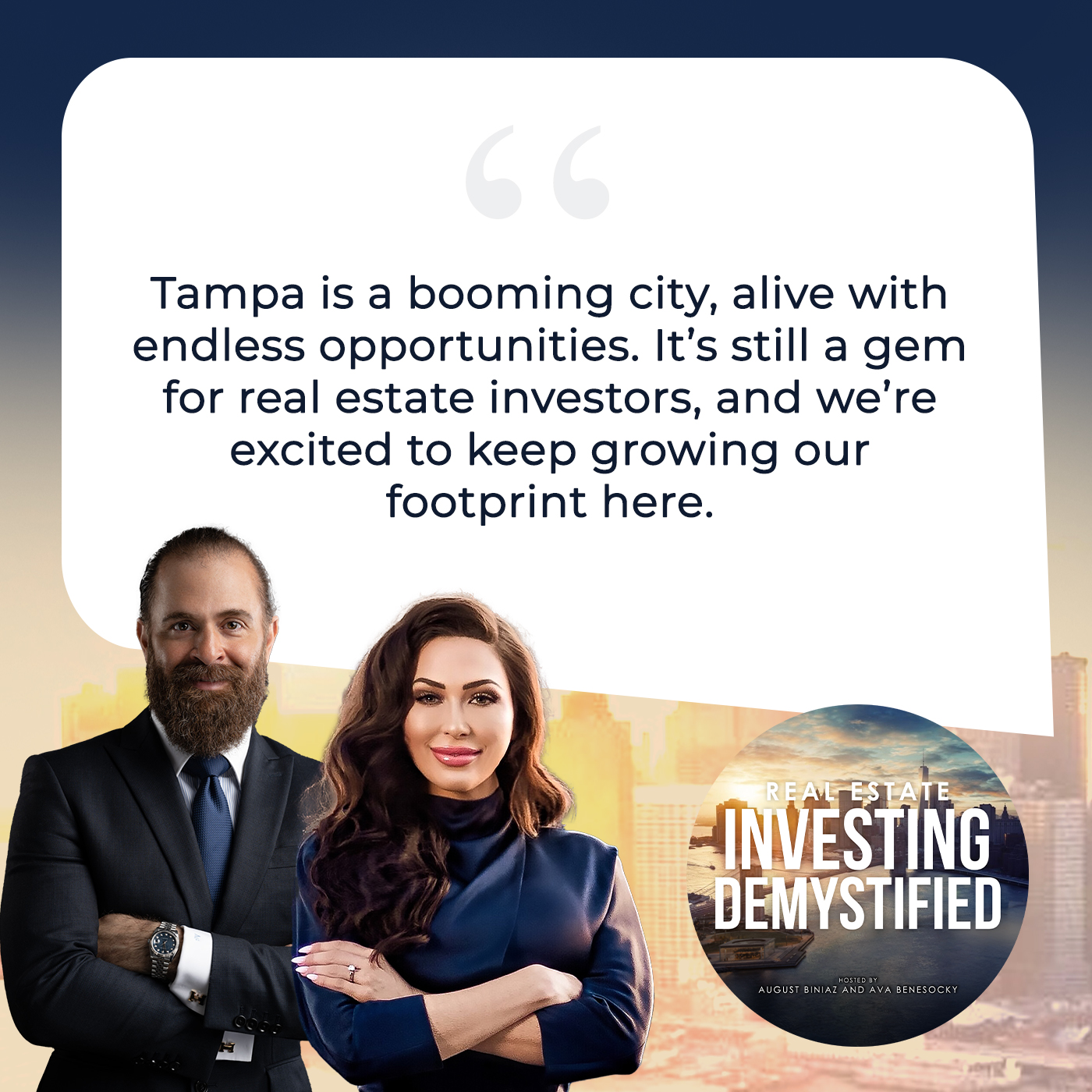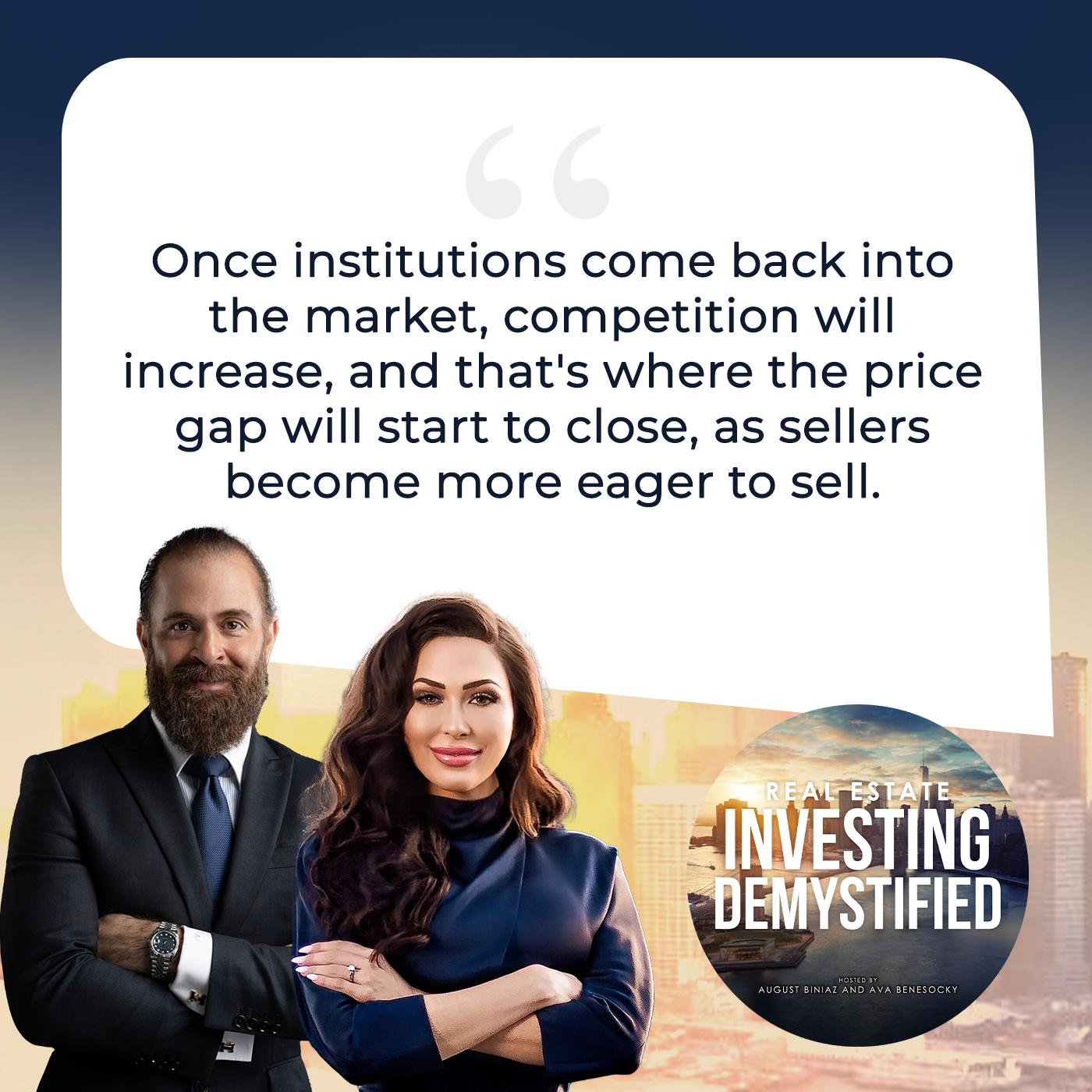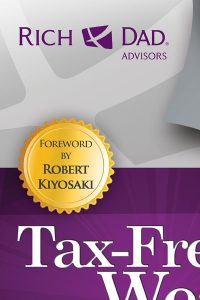Tampa’s multifamily market is red hot, and this episode is your guide to navigating its complexities. Join Ava Benesocky and August Biniaz as they dive deep into the Tampa multifamily market with Avery Jordan, Senior Director at Franklin Street. As a seasoned expert in middle-market multifamily brokerage, Avery shares his insights on navigating the current market, finding investment opportunities, and building strong client relationships that drive success. Tune in to discover valuable strategies and gain a competitive edge in Tampa’s dynamic real estate landscape.
Get in touch with Avery Jordan:
If you are interested in learning more about passively investing in multifamily and build-to-rent properties, click here to schedule a call with the CPI Capital Team or contact us at info@cpicapital.ca. If you like to co-syndicate and close on larger deals as a general partner, click here. You can read more about CPI Capital at https://www.cpicapital.ca/.
#avabenesocky #augustbiniaz #cpicapital
—
Watch the episode here
Listen to the podcast here
Important Links
- Franklin Street
- Avery Jordan – Franklin Street
- Avery.Jordan@FranklinSt.com
- Tax-Free Wealth
- Rich Dad Poor Dad
- Jacksonville Multifamily Investing 2024 – Luke McCann
- From Broker To Legend: Bob Knakal’s Rise And Market Predictions For NYC
About Avery Jordan

Tampa Multifamily Trends With Avery Jordan: $2B In Deals
Welcome back to the show.
Welcome back, everyone.
As I always like to share some exciting news when we start the show, the Fed decreased interest rates by 25 basis points.
It wasn’t that exciting because they put the doom and gloom that inflation’s still very sticky. We knew it was going to be sticky coming down from 9% down to around 3%. The last 100 basis points are usually the stickiest points of it. They’re still concerned. The question is why are they decreasing rates if inflation’s still a danger point?
That’s exactly what I said. This doesn’t make sense.
They would rather us not go into a recession. If there is a bit of inflation, that’s fine. People will try to live with that.
They’d rather have inflation rather than a recession.
We are in Naples, Southwest Florida. We love Florida. We’re Canadians who moved here. We want to bring attention to the state. Our guest is an expert when it comes to Florida, Tampa particularly, which is the hyperfocused region that we’re focused on. We acquired a property there not too long ago, Atlas at Bay Point, renamed after our son. Our guest is going to give us a crash course on Tampa and what he is seeing there. Tell everyone a little bit more about our guests.
I’m excited to share this with all the investors who invested with us in Tampa. On our show, we have Avery Jordan. He’s the Senior Director at Franklin Street and specializes in middle-market multifamily investment sales across central Florida. With over $2 billion in closed transactions since 2016, Avery brings a wealth of experience working with private investors, family offices, and private equity groups. Let’s start our show. Let’s get into things.
Welcome, Avery. Thanks for being here with us on the show.
I’m happy to be here. I appreciate you having me.
What Interested Avery Jordan To Get Into Commercial Brokerage
Commercial Brokers come from very diverse backgrounds. What interested you in getting into commercial brokerage?
I was born and raised in Tampa, Florida. I went to the University of Florida in Gainesville for college as an undergraduate and got a degree in finance. To be quite honest with you, I had come in with so many credits from my high school coursework that they told me that I was going to graduate early. I could have graduated a year early and I said, “I don’t want that. I’m having too good of a time here at UF.” I looked into some potential minors and picked up a real estate minor in college. I did some of that coursework and found it to be fascinating.
My father is more on the accounting side but works in commercial mortgages on the accounting front. I had a little bit of exposure to commercial real estate growing up through that. I loved my coursework at the University of Florida. Shortly after, I started here at Franklin Street in multifamily. I’ve been here for over eight years. It has been an amazing ride from 2016 through 2024 with the exponential growth that we’ve experienced here in Florida. I am very grateful to be in the asset class and the business.
Overview Of Franklin Street And Its Impact
Tell us a bit more about Franklin Street. We have our weekly huddle. Our different departments provide their KPIs and Franklin Street’s name comes up every week as far as how many deals are coming into our pipeline from you guys. Tell us about the firm a bit.
That’s good. I’m glad to hear that. If your guys’ core market is Tampa Bay Central Florida, that’s our backyard. Franklin Street is a full-service commercial real estate firm. We provide a bunch of different services to commercial real estate investors and occupiers because there’s a handful of businesses that need space that might not necessarily be investors in commercial real estate.
I’m on the investment sales brokerage side but we have a ton of other lines of business. We have capital, placing both debt and equity for deals. We’ve got insurance, which is fairly rare for a diversified commercial real estate services firm to have. We probably write the business on half a million apartments for insurance across the nation. We’ve got property management, project management, and leasing for all asset classes.
We’re touching these investors and occupiers of real estate in a number of different ways. The company is designed on a foundation of collaboration. We are constantly collaborating among the different business lines. We are very intentional about that. We’ve built our backend platforms like our CRM and our database so that we’re all communicating with each other not only on trends but on clients. We are also able to service these clients and provide value in ways outside of selling you a property or selling a property for you, which is fantastic.
Expanding a little bit on Franklin Street geographically, we are the largest owned and headquartered firm in Tampa for commercial real estate. We are expanding rapidly. We do have offices in all the major metros of Florida. We also have expanded out of state into Atlanta, Texas, Nashville, and the Carolinas. We opened an office in Ohio and Cincinnati. We’re going to continue to grow in all these high-growth markets and bring on really talented collaborative professionals. It’s a really exciting startup culture even though we were founded in 2006.
That’s great for you as a broker to have those different divisions you can bounce ideas by and get some data and information from as well. I’m sure that works great.
What It’s Like Growing Up In Tampa
You mentioned that you were born and raised in Tampa. Talk to us a little bit about growing up in Tampa. What was that like?
We found that out after researching you a bit. We found out that you were born and raised in Tampa. Tell us about that.
When I tell people I was born and raised in Tampa, their first reaction is always, “You’re so rare.”
It’s the same thing here in Naples too. It is a rare commodity to find somebody who was born and raised in Naples as well.
That’s because we’ve experienced so much population growth in the past couple of years. From my perspective as a local growing up here, all of my friends are coming back to live in Tampa. They might have gone to a big city for a job but they’re coming back to Tampa to settle down because it’s such a fantastic place to grow up and raise a family.
Quite frankly, it’s quite different than it was when I grew up. We have a tremendous amount of job opportunities that have come up as a result of that population growth and the business transitions down to Florida. It is very much different than when I grew up here. The drivers of that growth have largely been quality of life and affordability. I can resonate with that from childhood and growing up here. They were in abundance.
We still have a fantastic quality of life, and that might even have expanded far beyond what it was when I grew up, which was the beaches, boating, fishing, and all of that sort of thing. We’ve got amazing world-class restaurants covered by the Michelin Guide. We never thought that little old Tampa would be what it is now.
We’ve sacrificed a little bit on the affordability component. A lot of locals have struggled with that because the people we are attracting are high-income people from the Northeast, West, and a little bit Midwest. They’re able to stomach that. They’re almost making a little bit of arbitrage, taking a high-paying job from the Northeast and maybe moving down to Florida and either working from home or even getting a new job.
That’s been the newest challenge, balancing that increase in population growth driven by quality of life and affordability and trying to preserve that affordability for the local people. To be honest, it has created new opportunities. A lot of the suburban locations outside of the urban core of Tampa have blossomed with growth. You’re seeing some really interesting redevelopments all around town and some emerging markets that I’m sure you guys are looking at and interested in. It’s as interesting and as painful as it is to go through change and growth. It’s created a lot of good opportunities.
There are a lot of high rises coming there. There is a high rise going up downtown St. Pete. The starting price is $2 million and people are shocked. We’re like, “We are used to that in Vancouver,” seeing what happened to Vancouver over the last couple of years.
Tampa’s Geography And Metropolitan Area
On the business side, we love Tampa, but on the personal side, August and I were even thinking about maybe moving there personally as well. We’re in Naples but Tampa is very attractive and appealing to us as well. There’s an old adage in real estate, it’s location. On another note, let’s dive a little bit more into Tampa. Can you give us a 30,000-view of the lay of the land? Describe Tampa to us. There’s Tampa, the city itself, but you also have the MSA, which includes St. Petersburg, Clearwater, Largo, and Pinellas Park. Talk to us about that.
The Tampa MSA, which is Tampa, St. Petersburg, and Clearwater, is the second largest MSA within the state of Florida. We’ve got about 3.3 million in population, which is 2nd only to the Miami MSA, which is almost double that. It’s probably around 6 million.
It is larger than Vancouver. Vancouver is around 3 million. Vancouver is a big metropolitan city, the second largest city in Canada. Keep going.
Interestingly, it’s larger than Orlando as well. Some people get that confused, especially international investors from Canada. They might know Orlando more because of Disney World or the theme park draw. Tampa from a population perspective does have 3.3 million people. It’s number two in the state. It’s got an incredibly diversified economy, which is another little bit of an unknown for a lot of people. There’s the expectation that with the beaches, it may be heavily reliant on tourism. In reality, leisure and hospitality account for 12% of the economy.
It’s not the biggest economic driver in our research. We’ll touch on that in a bit as well.
We’ll get to that. Geographically speaking, there are some advantages. The MSA is situated on the West Coast of Florida along the Gulf of Mexico. The obvious benefit is that you get the sunset over the water on the beach. Tampa itself, St. Pete, and Clearwater, because of that being on the West Coast, everything to the West is water. You geographically have about half of your market, if you will, constrained. It’s heavily supply-restricted
In fact, Pinellas County, which includes St. Petersburg and Clearwater, is the most densely populated county within the state of Florida. What that creates is high barriers to entry for new development, which restricts supplies slightly. I don’t know if we’re getting into this later but there’s a lot of new supply coming online all over the country, particularly in high-growth markets like Florida with good population and demographic fundamentals. Tampa is more resilient in that respect than Jacksonville because it’s harder to build.
It’s the Vancouver effect. In Vancouver, you have the Pacific Ocean, the US border, the mountains, and ALR or Agricultural Land Reserves. You’re landlocked. Tampa is similar to that as well. You’re landlocked by the ocean. There are lots of waterways. There are areas that you can’t build because they fear flooding and what have you. I would see that in the city as well.
You’re starting to see Tampa is growing. All of the cities within the MSA are growing. That growth is starting to push out in all of the ways that it can, which is North, East, and South. Pasco County to the North, North is experiencing a tremendous amount of growth. If you were to talk about the areas experiencing the most oversupply, those are the areas that are happening. The infill markets of Pinellas County, which is truly completely landlocked and is a peninsula, are much more resilient and resistant to that supply concern.
If we’re talking about geography, we’d be remiss not to mention elevation. We did have two real storms this 2024, which is not anything out of the ordinary for Florida. There are certain parts that are lower elevation than others. A lot of people don’t realize downtown St. Petersburg is maybe less than a mile from the waterfront. You can be 40 feet above sea level very quickly with almost no flood risk.
We’ll touch on that in a moment. Touch also on transportation. We had our good friend, Luke McCann, who’s a broker in Jacksonville. He was talking to us about belt roads that have wrapped the city. If you want to get into a different part of the town, you jump onto a belt road and you’re somewhere else. How has traffic dealt with the population growth that you’ve had in Tampa? Do you guys have belt roads as well? How do people get around? Is traffic a big issue? I know the answer.
We’ve had to build a lot of roads. When you get a lot of people, you have to build a lot of roads. We’ve done that. We have a few belt roads that lead out to the suburbs to help those commuters where they can get a much more affordable home and still commute into the major job centers. Probably most notably on the horizon transportation-wise is the potential Bright Line Station, which is slated close to downtown Tampa. That will connect us to Orlando and furthermore to Miami.
When you get a lot of people, you have to build a lot of roads. Share on XThe Miami to Orlando stretch already exists. It’s getting the Orlando to Tampa stretch into production. Everyone seems to be very bullish that that is going to occur. It’s not going to be a twenty-year type of project. It’s going to be maybe a 3 to 5 or 5 to 7-year type of project until we have that station. That will be transformative for that. The I-4 corridor or Interstate-4 runs between Tampa and Orlando.
For the audience that might not know, another interesting near-term project is the Howard Frankland Bridge, which is 1 of the 3 bridges that connect the Hillsborough County side to the Pinellas County side, between Tampa, St. Pete, and Clearwater. That is being completely rebuilt. They’re adding the ability to transition it to multimodal transportation in the future. They think that it could be an opportunity to add light rail between Hillsborough and Pinellas Counties.
There are a few projects that are in the works. We’ve had a ferry system that was piloted and still exists but it’s this downtown St. Pete and downtown Tampa type of run. There is going to be an extreme focus on transportation over the next ten years in Tampa. That’s probably the one area where we’re lacking, is getting good public transportation throughout our cities.
In all my travels to Tampa, I haven’t encountered major traffic jams like other cities have. It’s great to hear that you guys are still even boosting that.
Economic Growth Drivers In Tampa
To switch the topic a little bit, at CPI Capital, some of the key growth metrics that we are focused on are job growth, income growth, population growth, and rent growth. Let’s talk about the economy a little bit. You were going to touch on it. What are some of the major economic drivers in Tampa?
The port is a huge one. It often gets overlooked but we have the largest port by tonnage in the state. About half of all of the trade and commerce that happens via sea or via waterway comes through the Tampa port. They’ve got some interesting specializations that help as well. They’re bringing in cargo from all over the world. About half of the gasoline within the state of Florida comes through the Tampa port as well. It’s a huge economic driver.
The I-4 corridor, which I’ve touched on very briefly previously, is a massive distribution hub for the super MSAs of Tampa and Orlando. That’s largely fed by the Port of Tampa. That’s a big driver. Professional and business services are a big chunk of the pie in terms of our economy. Outside of that, you’ve got leisure and tourism. You’ve got a tremendous amount of healthcare. If you end up pulling up a picture of the pie of Tampa’s economy, you’ll find it’s extremely diversified. There isn’t overexposure to any one segment.
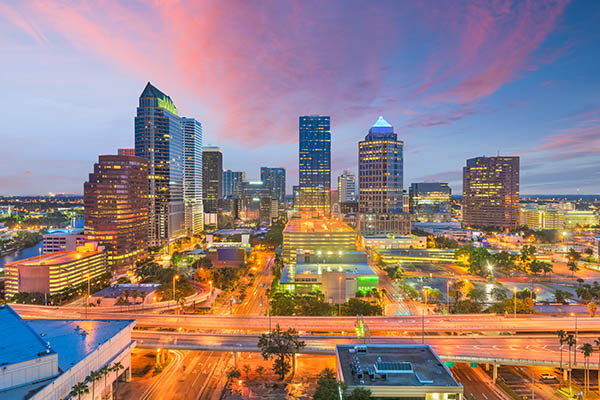
Multifamily: Tampa’s economy is extremely diversified with no overexposure to any one segment.
It’s less than 20%.
For the audience to understand, it’s a good economy to invest in when the city doesn’t have more than 20% of its economy in 1 sector. It sounds very diverse and it probably doesn’t have that over the 20%, it sounds like.
A little quick background with CPI, when we were starting to figure out what market we wanted to be hyperfocused on and grow the company there because we were still in that growth phase or that boutique phase, we were agnostic in what market we wanted to be in. Tampa kept coming up at the top of our list. Even when we focused on Florida, Tampa kept coming up on our list because of the diversity of its economic drivers.
Tampa’s Sports Teams And Local Culture
There are so many other reasons as well, like work-life balance. A lot of people are moving here not only for jobs. Retirees are moving here as well. I’ll get into that in a moment and touch on that a bit more. I love to see what Tampa has to offer and the growth of the city. Changing the conversation a bit, let’s talk about sports teams. You guys have a bunch of sports teams as well. Tell us about the major league teams you have.
What’s your favorite team?
We’ve got the NFL. We’ve got the Tampa Bay Buccaneers. We had Tom Brady for a little bit. We’re riding high with the Super Bowl. Everybody has seen the famous picture of him throwing the trophy at the boat parade. If that doesn’t show you Tampa’s quality of life, I don’t know what does. We also have the Tampa Bay Lightning. Emily Arena is their stadium or their rink in downtown Tampa.
The owner who sold a significant stake in the team and bought the Tampa Bay Lightning came from New York City. He was a hedge fund kingpin up there, bought the Tampa Bay Lightning, and quietly amassed 50 acres of downtown land. It was all qualified under the opportunity zone program. These were all parking lots in the downtown core of Tampa in the depth of the recession.
He has gone vertical and completed phase one of that project called Water Street, which has reshaped our downtown core, which was primarily office. The streetscape wasn’t activated because the restaurants could only be lunch restaurants for the office workers. There was no one living there. He’s done a tremendous job creating condos, apartments, and hospitality with hotels all in this live, work, and play district and activated the downtown core of Tampa. That was a tremendous boon for us. It put us on the map with a couple of big flags.
Bill Gates’ investment firm is one of the partners or investors in some of those deals or in that deal.
Cascade is the firm. That’s Bill Gates’ firm. I thought they were able to do 100% equity from that, which is how they were able to develop as quickly as they did in that cycle. That was transformative. It’s interesting to see the decision-makers in our sports teams so invested in the community and in real estate. Truly, the sports teams and sports owners are shaping the real estate of downtown.
We’ve got the Tampa Bay Rays right across the bridge from Tampa and St. Petersburg. They’re going through their own situation, which is yet to be resolved. They did have a deal where they partnered with Heinz, which is the largest private developer in North America to do a 90-acre mixed-use redevelopment of the Tropicana Field site. We’ll see. There are some news headlines out there on whether it’s going to happen or not at this point. It is very interesting to see in this town the number of large swaths of downtown core real estate related to our sports teams that are being redeveloped at the moment.
People sometimes also have a misunderstanding about Tampa and where it’s located. Me and our director of acquisition, Paul Hopkins, were in Dallas at a conference a few months ago. We heard so much about Dallas. It was my second time visiting. The first time, I was so busy that I didn’t get to go around the city. This time, I was able to go around. I got into a lot of Ubers, met with a lot of people, and had meetings.
I was excited to learn more about Dallas. It’s a vast flat land. There’s not much there. I saw on the map that there were a couple of lakes there. They were like, “Those are man-made lakes.” I ask people, “What do you guys do here? Is there hiking? Is there fishing? Is there boating?” There’s not much to do there and it’s unbelievable how the city has grown. There are 8 million people and it is expected to be 15 million at some point but there’s not much there.
I was at our property at Atlas at Bay Point in St. Pete. When we were doing research to buy that property, it was less than a twelve-minute drive from some of the nicest beaches in the world. There’s so much to do in the city. You’re less than 30 minutes away from the airport and less than 30 minutes away from downtown Tampa. The city is so alive. There’s so much to do and it’s such a boom.
The Impact Of Natural Disasters On Investment Sentiment
I honestly feel Tampa is still a gem for real estate investors. They have such a long runway. Some of the next questions that are coming up are about hurricanes and storms. It does come with a caveat of hurricanes and storms. Even if you consider that, Tampa still has a much longer runway than these other cities do. The Dallas of the world, Phoenix, and what have you, are the darling of multifamily investors but Tampa’s got so much going for it. We’re excited to keep growing our footprint in Tampa.
Work-Life Balance In Tampa: Outdoor Activities And Fun
The next topic we want to chat with you about is work-life balance. I know you’re a commercial broker. It seems like we’ve been mostly talking to you about the city but we’ll get into some commercial brokerage items as well shortly. Talk to us about the work-life balance. What is fun to do? What do you do for fun? What do others do aside from boating and everything else? Tell us.
We work very hard here but there’s a tremendous amount of lifestyle opportunities here. Some have existed for a long time, which are the natural elements of the amazing weather, the sunshine, the world-class beaches, and a bunch of other outdoor activities that come along with that. There’s golfing, fishing, going to the beach, and cycling. A lot of the hobbies that you can do are outdoor-type hobbies.
You hear from people up North that there’s truly a seasonal depressive situation when you’re stuck inside and you can’t do anything. I was walking back from lunch and it was 72 degrees and sunny. We are in mid-December. It was a reinforcing belief like, “This is what Florida’s all about.” There are endless opportunities to do outdoor activities here. There’s something for everybody. Those happen to be some of the ones that I enjoy doing.
The Impact Of Natural Disasters On Investment Sentiment
Let’s get into storms, hurricanes, and everything. One of the biggest questions from our investors, particularly from the Canadian investors because they’re watching catastrophic news when storms hit, is about force majeure and how it plays into investing in Florida, especially when they see all this stuff on the news and how catastrophic it can be.
How do all the natural disasters like hurricanes impact investor sentiment, if at all? In your experience, does the threat of severe weather affect the long-term outlook for real estate investments in the region? Particularly, Hurricane Milton hit. It was over a century since a hurricane hit Tampa head-on. That raised a lot of red flags for investors. I wanted to get into this with you as you’ve been living there and so forth and you are a broker there.
It is certainly becoming more part of the conversation. The back-to-back impact of Helene and Milton was unexpected. It’s causing some reaction from investor sentiment and some probably justifiable cause for caution. It’s the type of thing where if it happens year after year, we’re going to have an issue and something to work through, particularly for properties in low-lying areas that are prone to risk.
It’s important to note that there are almost no claims from the new construction product so clearly, the new building codes are working. If you’re in a low-lying area, they’re going to require you to build it up. A lot of it had to do with the older vintage product that was in the wrong place. The impact is probably overstated and the sentiment is probably overly cautious because we went through it. I’ve been in Florida my whole life. These storms are part of our experience here.
You have hurricane parties. That’s something we never heard of before coming to Naples.
In college at least. My wife’s not letting me get away with that anymore.
I always ask our friends here, “There’s a hurricane coming. Are you guys going to evacuate?” They’re like, “We’re going to have a party. Why don’t you come on over?” We’re like, “Let’s do that.”
A lot of the time, it’s rare that we have such a direct impact. From Milton, there was a serious risk of a direct impact hit right on Sarasota. That’s a little different. Hurricanes happen all the time. The impact zone from winds is pretty small. It might be 30 or 40 miles that are going to experience those hurricane-force winds that you see on the news. Outside of that, it’s not as devastating. I do think there’s a little bit of media overhype to it. It certainly was a real experience. I don’t want to undermine anyone that dealt with anything from Milton.
Helene was very eye-opening for us as well in terms of our exposure to flood risk. Both have probably caused some cities to reevaluate their stormwater drainage systems. I know for a fact in Tampa they’re doing quite a bit of stormwater drainage improvements to mitigate that risk moving forward. It’s a part of the situation down there. It’s a risk that can be mitigated through proper insurance. A trade-off for the quality of life that we’re talking about down here is how to deal with that.
Commercial Real Estate Investors In Tampa
Let’s switch the conversation and talk about commercial real estate as far as the profile of the investor that you’re dealing with. I’ve done some research prior to the show and we’ve chatted a few times. You work very closely with our acquisition team. What is the profile of the investor buying multifamily in Tampa? Is it locals? Is it nationwide groups or private equity groups? Who’s buying multifamily in Tampa?
For the most part, it’s going to be out-of-area private equity groups. These are people with a variety of different deal structures, whether it’s a one-off syndication basis or a fund that needs to be deployed. They’re generally concentrated where the wealth is concentrated or the capital is concentrated, which you’ve got a lot in the New York and New Jersey markets and South Florida in Miami-Fort Lauderdale.
For the most part, it’s going to be private equity groups. There is a fair amount in a certain deal size where you get high net-worth private clients who are still investing. Over the years that I’ve been in the business, there has been a transition from the bulk of activity being high-net-worth private clients to more private equity groups, one-off syndications, and funds that are doing deals.
What have you seen as far as deal flow? We’re in a very interesting time. We came through COVID and then the post-COVID inflation. The Fed had to fight inflation. We were talking about it when the show started. They were increasing rates and are starting to decrease rates. I’ll give you some mind-blowing stats with us here at CPI. When we closed on our deal in early July 2024, I wanted to pull some stats and see what type of market share we have and how many deals are being traded.
In the trailing 12 months from July 2024, we had 83 deals that came into our pipeline. Take it that some of those deals were in other areas in Florida, like Central Florida and Southwest Florida. 83 deals came into our pipeline. From those 83 deals, 21 properties were sold. Of those 21 properties, 6 properties were sold in the Tampa MSA, which matched our criteria, which is 100-plus doors and less than $50 million. We bought one of those properties.
Aside from all the difficulties that private equity groups or syndicators like us go through, which is securing the equity and getting a deal done in that shotgun approach, deal flow is a difficult part as well because there are not that many deals happening. Is that something that other groups are also complaining about? Is that a pain point from your investor clients?
Absolutely. You bring up interesting statistics. Congratulations. 1 out of 6 is a pretty phenomenal market share for you guys. The number of properties that have come to market and not transacted. Even the number of listings is down significantly. 75% of the listings that have come to market on the numbers you shared are not trading. There is a bid-ask spread that still exists that is very difficult to close. Only in unique situations where sellers are truly motivated is that transaction occurring. Kudos to you for finding one of those motivated sellers.
I’ve run some stats. Our market, Tampa Bay, and this applies broadly to all of central Florida, the transaction volume is down 75% from its peak. In some places, you could probably argue 80%. It’s a challenging market. The reasoning behind what’s driving that drop in transaction volume is nothing surprising. The Fed started its interest rate hiking cycle in March of 2022. If you look at the transactions, there’s still a fair bit that got done throughout December 2022. A lot of those deals were put in place prior to that interest rate hiking regime. They were legacy deals.
Since January 2023, there have been very few transactions happening because we’ve been in a higher interest rate environment. We’ve been in a higher supply environment, which has put some softness into the rental market from an asking rent perspective and from a vacancy perspective. Quite frankly, that’s resulted in a challenging market for value add. When you have those factors, it makes value add difficult. That was the situation that we’ve been in for almost three years.
You get to March 2025. We all know the Fed is cutting rates. You mentioned it earlier. There is another 25 basis point drop. We are in the opposite. We are at this inflection point in the market where things are about to pick up tremendously. The forward-looking pipeline for our listing activity and even the soft indicators like the conversations with sellers and the appetite to meet the market and transact have gone through the roof. We’re expecting 2025 to be active and certainly much more active in the past few years.
That’s so amazing. How about on the institutional level? Do you see institutions coming back into the market anytime soon since interest rates are decreasing?
Absolutely.
We know once institutions come back into the market, competition is going to go up. Sellers are going to be more excited to sell. What are you seeing there?
To be quite honest, the people that I’m talking to are mainly these private equity groups. Honestly, private equity groups are similar to yours. I am not calling up all of the institutions and getting their appetite but from what I hear in the market and through different market participants, they’re back. That doesn’t apply to a macro level everywhere.
For high-growth Sun Belt markets and particularly the multifamily sector, which is historically resilient because people need a place to live, there is going to be a lot of capital that needs to be placed. Quite frankly, it’s needed to be placed for a while and it’s been sitting there. Not to reuse a COVID term that we talked about when everything was shut down because of COVID, but there is a tremendous amount of pent-up demand to place capital into multifamily real estate in the Sun Belt.
Underwriting Deals And Whisper Prices In Commercial Brokerage
I want to talk to you about one more point before switching the conversation. A lot of times in our communications with brokers that we work with such as yourself, we do an assessment on a deal and do our underwriting. We send in our letter of intent and start the communications with the broker. A whisper price is the price that the broker is telling the buyers about the property, which is different from residential for some of our audience who are tuning in. There’s no actual list price like MLS style. It’s more of a whisper price that the commercial broker provides to the buyer. At times, we feel like our price is too far away. We get on a call with the broker and provide them with our underwriting model.
When you’re trying to work on a listing for a client and you get that listing, do you underwrite the deal yourself with your own model? What type of assumptions do you make? The follow-up to that would be if you feel after you’ve provided a whisper price but you’re having a lot of your potential buyers coming in and the price is too far away from your whisper price, do you go in and look at their underwriting model and see what assumptions they’ve made? Do you maybe even advise them, “The insurance code that you got, we got an insurance provider that can provide you better rates.” Talk to us about the mechanics of how it works when there is a disconnect between what the prices are coming in and what you guys originally underwrote the deal at.
It’s particularly valuable. I imagine for a lot of the readers here, it’s a very small part of the world that we operate in. We have a very niche focus. Not everybody understands the mechanics of what goes into the relationship between a broker and an owner throughout the disposition process. It begins with a broker opinion of value.
The owner, if they’re contemplating a sale and or if they want an updated valuation, will reach out to us and provide us with the necessary financials and we will do a full analysis. We’ll look at the financials of the property and do the cashflow analysis. We’ll look at rent comps in the market to determine if there’s any upside based on an untrended basis based on comps. We’ll look at sales comps both per unit per square foot and cap rate basis. It’s similar to an appraisal but it’s not. It’s a broker opinion of value. We’ll then talk about strategy and marketing recommendations.
The strike price that we provide throughout our broker opinion and value process may not be what the seller decides to whisper as far as a whisper price. It’s not so cut and dry where that whisper price is a finite number. Sometimes, there’s flexibility given if there’s enough trust built between the seller and the broker to where they can say, “Use your best efforts to guide the market.”
If we’re whispering $100,000 and the whole market is at $70,000 and you think you don’t want to present that offer because you’re too far off, then we’re not doing our job. We’re not gathering market data to provide the owner with a true market value for the property. It can be handled in a few different ways on that front.
To your point, it’s an ongoing dialogue between broker and seller and broker and buyer. We are getting all of the necessary pieces upfront, including an insurance quote, a debt quote, and sometimes a management quote if a buyer needs a management company as well. We’re providing that to you and having a discussion about that.
We’re talking through your underwriting in great detail in order to figure out where the disconnect might be. The disconnect might be on return. You and the seller could have the exact same thoughts on underwriting but the seller wants X price and you want to buy it for Y price. At least we understand it, and that understanding is critical to managing expectations. That’s how the process works. If I need to add any more clarity to any step, I’m happy to.
An understanding of differing perspectives in real estate transactions is critical to managing expectations. Share on XCurrent Cycle In Multifamily Real Estate
You did a tremendous job. That was great. We know you have a hard stop. In respect of your time, this is the last question before we get to the next segment of our show. This is a question I like to ask experts when they come on the show. It’s great to have you here. This is somewhat nationwide. If the multifamily cycle we’re in was a clock, 12:00 being the top of the market and 6:00 being the bottom of the market, what time is it?
Honestly, it feels like it’s got to be 6:00. It feels like we’re at the bottom of whatever cycle and we are about to emerge. Thankfully, we’re in Tampa, Florida. I’m in Tampa, Florida, and covering the Florida markets as well because our experience over this next cycle is going to be vastly superior to a lot of other markets to our fundamentals and our population growth. We’re 2 and a half to 3 years into a rate hiking cycle that has finally started to correct. The tailwinds are very much at our back for the first time in a long time. Kudos to you guys for being able to get a deal done in the difficult market. That’s going to age very nicely. We’re right at the inflection point.
It’s exciting. I know I always say this but survive until 2025 is out the door and thrive after 2025 is here.
I like that.
10 Championship Rounds To Financial Freedom
That’s right. Thank you so much for that information. Let’s get to the next segment of our show. We’re going to ask you some Rapid-fire questions for our audience.
This may be a little bit of a surprise to you but it’s called the 10 Championship Rounds to Financial Freedom. Whatever comes to the top of your mind.
Take your time. Some questions might be interesting but we’ve had interesting dialogue between us and our guests. It gives the people and potential clients of yours to get a glimpse into the inner workings of your brain with these questions. Go ahead, Ava.
Are you ready, Avery?
I’m ready.
First question, who’s been the most influential person in your life?
It would be my parents. They gave me a phenomenal foundation, great values that I’ve been able to leverage throughout my life, and a great education. Honestly, I can’t repay them enough so I’m trying to do my best every day to thank them for what they’ve given me.
I love that. Maybe Atlas and Apollo, I say that exact same thing.
It motivated us to be better parents. Let’s go to the next one.
Next question, what is the number one book you’d recommend?
I had a book that was recommended enough times to me by clients that I had to go get it. It has been very impactful. It’s called Tax-Free Wealth. It’s part of the Rich Dad Poor Dad series. I believe Tom Wheelwright is the author. For real estate investors and anyone in business, it’s a great read.
Next question, if you had the opportunity to travel back in time, what advice would you give your younger self?
I would’ve bought everything in 2016. I would’ve bought as many multifamily deals as I could in 2016. That’s my business advice. Outside of that, life advice is reassurance. It’s not an easy business to scale in and break into. There’s a long learning curve, multiple years of building relationships without seeing anything in return for that. Have reassurance that you’re on the right track. Keep grinding and focus on the inputs, not the outputs.
I love that. Avery, what is the best investment you’ve ever made?
This isn’t a very Rapid-fire answer, is it? The audience is going to find out that I think about things too much.
Take your time. It could be metaphorical as well. It’s up to you.
The best investment I ever made is the only real estate property that I own. I sponsored it. I bought a four-unit apartment community in our quad in South Tampa in 2021. I had it for a little over three years. I have become the property manager of that. I am the sponsor, the asset manager, the property manager, sometimes the maintenance technician, and the leasing agent all at once. It’s been an incredible time commitment but the amount of value that’s been created for me and my ability to interact with other multifamily owners and clients is invaluable to me. That learning curve has been so much fun.
I love that. What’s the worst investment you’ve ever made and what lessons did you learn from it?
The worst investment I ever made was investing my time in off-market deals where I didn’t know the buyer or the seller. Off-market deals are low probability exercises to begin with but they’re dramatically lower probability if you don’t have a good relationship with the buyer and the seller. As brokers, our goal is to focus on exclusive listings. We’ll do some off-market deals here and there, but it’s very important early in your career especially not to fall for that trap and to make sure that you have good relationships with both sides.
It's very important early in your investing career not to fall for that trap of off-market deals and to make sure that you have good relationships with both the buyer and seller. Share on XNext question, how much would you need in the bank to retire? What’s your number?
I’m going to be honest. I don’t think I will retire. There would be no fun in that life. I truly enjoy a challenge. I enjoy working with people. Our culture at this company specifically is amazing for that. If you gave me $100 million, I would still find a way to go out there and meet people and do business.
We had Bob Knakal on our show who’s done over $25 billion of deals in New York and is 1 of the top brokers there. I had the same question. I’m like, “Why haven’t you retired yet?” The guy is like, “I get high off of this pretty much.”
He’s having too much fun. It’d be fun to retire for 3 months or maybe 6 months, and then I’d be looking around like, “It’s time to get back to work.”
Get back to your passion. Next question, if you could have dinner with someone dead or alive, who would it be?
I would go with my grandfather who passed away. It’d be really fun to go have dinner with Jesus, George Washington, or something like that but at the end of the day, I’m not sure if I’m going to get anything out of that. I’d have to pick one of my closest relatives, which was my grandfather.
If you weren’t doing what you’re doing, what would you be doing?
If I was not doing this, I would love to say I would be a professional golfer but that is probably not realistic for me unless there were some serious life changes that happened. If I’m not in brokerage, I’m still in the business and I’m working with people like yourself on creating wealth for others and building a portfolio. That’s awesome.
This is my favorite question. Book smarts or street smarts?
I am the perfect combination of both. I don’t say I’m great at either of them but I have a little bit of book smarts and a little bit of street smarts. I like to think that I can relate to people that are either-or.
That’s amazing because it is the best of both worlds.
How about in your interactions with a lot of these institutions, hot shots, and kingpins that you described? How about dealing with them? Do you get a feel that a lot of these guys are book smarts or street smarts?
When you get to that level, you’re always a little of both but they lean on book smart. Those guys and girls are wicked smart. They all come with amazing resumes and pedigrees. They’re in the weeds on the numbers. They’re truly capital allocators that are so far removed from the problem on-site at the property and the maintenance issue. They probably couldn’t do a drywall patch but they can allocate$100 million to $200 million in a fund. They’re more book smart. As you get down to the mom-and-pops and the Avery Jordans that own their own quad and are out there on the weekend, you probably get a little more toward street smarts.
I had to sneak that question in. Go ahead, Ava.
This is the last question, Avery. If you had $1 million in cash and you had to make 1 investment, what would it be?
I would keep rinsing and repeating what’s been successful for me, which has been great locations and quality real estate. For me, those are deals in South Tampa. Picking a great, fantastic location in a growth market and rental housing is the way to go to build long-term wealth.

Multifamily: Picking a great location in a growth market for rental housing is the way to go to build long-term wealth.
Thank you so much for that. There is so much we learned and so much we gained.
Avery, you’re a very knowledgeable broker. Why don’t you quickly tell people the best way that they can reach you?
You can reach me anytime via email or call. My email is Avery.Jordan@FranklinSt.com. My cell phone is (813) 695-3765. Feel free to call, email, or text me. I’m always available. I look forward to hearing from you.
Thank you so much, Avery. We really appreciate it.
Thanks for everything, Avery.
Thank you. I enjoyed it.


